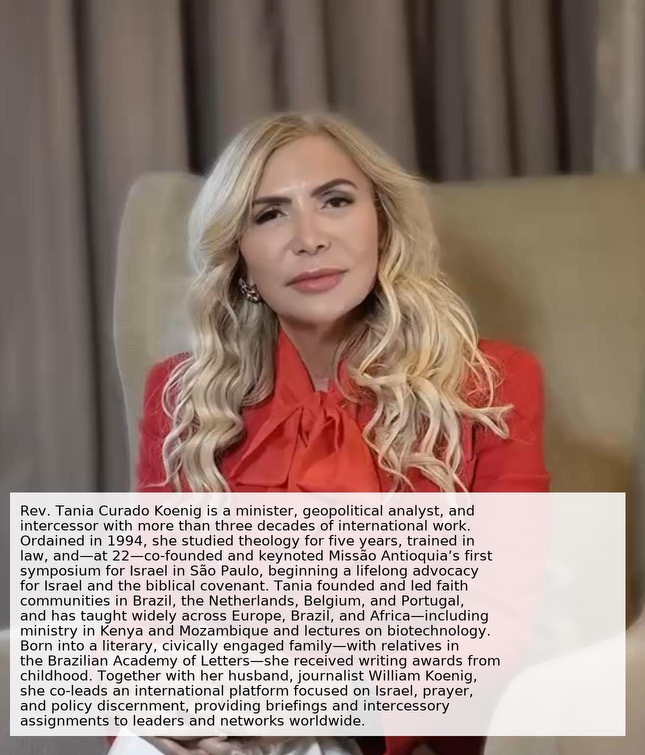
By Tania Curado Koenig
Jerusalem — October 25, 2025
I was born into a family that learned, across centuries, to stand still while other people claimed our story. We were called Catholic nobles in Portugal — safety wrapped in a script. Yet the older women still measured flour on Friday the way their mothers did. Certain words were whispered in kitchens. A candle knew when to burn.
We kept what we were told to forget.
That is how you live when power decides it can write on your name.
That memory returns each time an empire arrives to lecture Israel about its borders. It returned this week when Vice President J.D. Vance stood in Jerusalem and called a preliminary Knesset vote on sovereignty in Judea and Samaria “a very stupid political stunt.”
He may have meant “unhelpful optics” or “bad timing,” but the meaning was clear: a foreign official censuring a democratic legislature for doing its work. The issue is not whether one agrees with the bill; it is who presumes the right to scold a parliament’s motion. That right is not friendship. It is leverage.
Solomon wrote it plainly: “The borrower is servant to the lender.” (Prov 22:7). Aid is never neutral; it carries the lender’s hand as well as his coin. When Biden tied support to conditions, Israel bristled. When Trump offers the same leverage with a friendlier accent — pledging no annexation to comfort Arab courts — it remains leverage.
A president may promise what is his to promise — money, flights, approvals. He may not promise what is not his: the reach of another nation’s sovereignty on covenant ground. The signature binds the signer to a consequence he cannot manage. That is what I mean by sentence — not divine hatred for a man, but the inbuilt judgment of trespass. Declare ownership over what you do not own, and the structure you build will turn on you.
Trump revealed this misreading in his Time Magazine interview. “Israel was so intent on the hostages,” he said. “I was actually surprised. You would have thought they would have sacrificed the hostages in order to keep going.”
The line was meant as admiration. It betrayed blindness to what drives this nation. Israel’s instinct to value its people above its campaign is not hesitation — it is covenant.
Standing beside Netanyahu, Vance repeated the mistake. His comments were not diplomacy; they were a performance of hierarchy. Netanyahu, measured but unmistakable, reminded reporters that Israel has decades of experience in security and governance. The tone was calm, the meaning sharp: experience speaks for itself, and Jerusalem needs no tutorial in self-preservation.
The brokers surrounding the desk do not help. Steve Witkoff and Jared Kushner spoke on television about “betrayal,” as though the wound were a missed window, not murdered families. Their grammar is the grammar of transactions. It is useful in acquisitions. It is disastrous where the argument is not price but meaning.
In Jerusalem, betrayal is not a timing error. Betrayal is speaking terms over graves.
Turkey has not changed its doctrine. President Erdogan has been explicit for years: Ankara seeks influence over Palestinian politics as a plank of neo-Ottoman projection. He compares Israel to Nazi Germany, praises Hamas as resistance, and now volunteers as mediator.
Turkey is in NATO; it also purchases S-400s from Russia. It funds actors who keep conflict just warm enough to be useful. This is not confusion; it is strategy.
Qatar refines another instrument — patronage disguised as mediation. Doha’s currency is access: cash for stipends, airtime for narratives, channels for messages. Its dividend is leverage. The goal is not to eliminate the militant engine; the goal is to own the switch.
Each time Washington treats that switch as humanitarian architecture, the model is preserved rather than dismantled.
The pattern reached its absurd conclusion when President Trump met the Emir of Qatar and his prime minister aboard Air Force One en route to Malaysia. Doha remains Hamas’s banker, yet Washington still circles it for reassurance while lecturing Jerusalem on restraint. The stop cost millions, came while the United States was in government shutdown and the deep-state crisis went largely unaddressed, and exposed a presidency absorbed in playing global peacemaker while neglecting the chaos at home.
Egypt wants the border quiet and Sinai sealed. A UN Security Council stamp on an International Stabilization Force allows Cairo to advertise responsibility while hedging risk. The formula — “foreign forces in Gaza, Gaza managed by Palestinians” — sounds balanced. In practice it produces outsourced sovereignty: Israel held responsible for outcomes, external actors holding the instruments, patrons holding the keys to compliance.
Anyone who has read the minutes of past missions knows what happens next: blue helmets absorb blame, the bureaucracy absorbs funding, and the gunmen absorb time.
Inside Israel, the motion is the opposite of the press conference. Battalions rotate through Judea and Samaria. Sovereignty bills move to committee. Ministers fall and reappear. Civilians arm themselves because the country refuses to outsource survival.
Reality moves faster than diplomacy, and reality is not impressed by podiums.
My family’s “conversion” purchased space, not truth. Edicts claimed jurisdiction over our souls; we complied outwardly and kept faith inside. That spiritual dissonance repeats itself whenever external power presumes rights it never earned.
When I watch a motorcade close Jerusalem so that a Catholic vice president can tour the Holy Sepulchre — a site cherished by many, uncertain to archaeology — and then ignore the Western Wall, the living center of Jewish prayer, I do not object to his devotion; I object to the misreading.
It is ceremony masking authority — interference disguised as care.
Power without discernment eventually collapses under its own applause. The same hand that signs promises it cannot keep will find those signatures returned as judgment. Trump believed he could rebuild the Middle East by underwriting Arab promises and disciplining Israeli conviction. He misread both.
The Arab capitals will take the funds and the credit; Israel will take the blame and the isolation. Washington, distracted by its internal collapse, will discover that you cannot bless what you simultaneously restrain.
The cost of that miscalculation is already visible. The America that once projected order now wrestles with shutdowns, debt ceilings, and political paralysis. The administration that speaks of “stabilization” abroad cannot stabilize its own streets. Power is being exchanged for influence, faith for financing, sovereignty for spectacle.
History is merciless with such paradoxes. When nations reverse the order of loyalty — placing profit before covenant, calculation before conscience — they do not need enemies to weaken them; the logic of their own policy does the work.
What we are watching is not merely politics. It is the slow unraveling of alignment. The same voices that once stood for biblical clarity now speak the language of appeasement. The result is moral confusion dressed as strategy.
The hour is late. The country needs repentance more than applause, clarity more than noise. Let those who still care about truth return to prayer and to the disciplines that restore a nation’s soul.
When this storm passes, the land will still be here — quiet, unbroken, waiting for those who learned how to listen rather than lecture.
